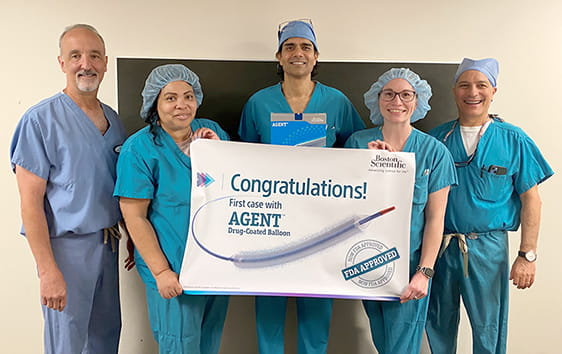Lankenau Heart Institute team completes region’s first procedure to clear blocked coronary stent
Despite special drug coatings on stents, previously opened arteries can block up again in 5–10% of patients. The AGENT™ drug-coated balloon is a new minimally invasive option to prevent recurrence.
Wynnewood, PA — In a medical milestone for the Philadelphia region, a cardiac team at Lankenau Heart Institute, part of Main Line Health, has successfully completed the area’s first procedure using a new drug-coated balloon to clear a blocked stent previously placed in a treated artery.

More than 400,000 patients undergo percutaneous coronary intervention (PCI), also called angioplasty, to open blocked arteries every year. The procedure often is followed by placement of a stent: a small wire mesh coated with medicine to help keep the artery open. However, scar tissue can still gradually develop inside the stent in 5–10% of patients, causing the vessel to narrow again.
Interventional cardiologists Sarang Mangalmurti, MD, and Timothy Shapiro, MD, last month became the first in the region to treat a patient with this latest technology, which was implanted through a minimally invasive procedure. After reopening the coronary artery, they inserted the AGENT™ Drug-Coated Balloon through a catheter to deliver a drug called paclitaxel to the vessel wall to prevent re-narrowing. Data from a clinical trial enrolling 600 patients showed the drug-coated balloon to be more effective than an uncoated balloon, with the U.S. Food and Drug Administration earlier this year approving the device. The AGENT balloon has been used to treat more than 100,000 patients in other countries.
“The AGENT drug-coated balloon is a game changer in treating a problem that has challenged interventional cardiologists for decades,” said William Gray, MD, System Chief of Cardiovascular Diseases and Co-Director of the Lankenau Heart Institute. “This device is a significant innovation that addresses the stubborn problem of restenosis of stented coronary arteries. We strive to give our patients the most advanced care, and the AGENT balloon is a cutting-edge option that we’re proud to make available to them.”
As with any heart blockage, patients with restenosis may experience chest pain, shortness of breath, nausea, weakness, irregular or fast heartbeat and sweating.
“It is exciting for us to have been the first health system in the region to use the AGENT drug-coated balloon,” Dr. Shapiro said. “Traditional therapies besides uncoated balloon PCI include placing another layer of metal stents and radiation. Avoiding those options when possible is a real step forward.”
Dr. Mangalmurti said paclitaxel is a potent anti-scar tissue drug that reduces the chance of the stent clogging again. “It’s an important advance,” he said. “When we clear a blocked stent, we don’t want to have to keep bringing the patient back again for more procedures. Importantly, results from the AGENT trial indicate additional benefits to other treatment options, including a reduced risk of clotting and heart attack.”
About Lankenau Heart Institute
Lankenau Heart Institute is Main Line Health's premier comprehensive cardiovascular program, bringing together the collective expertise of cardiologists, cardiovascular surgeons and advanced practice providers across all four of the System's acute care hospitals — Lankenau Medical Center, Bryn Mawr Hospital, Paoli Hospital and Riddle Hospital. Through a coordinated approach, Lankenau Heart Institute offers a full continuum of high-quality cardiovascular care, from prevention and diagnostics to advanced treatments and rehabilitation, delivered with a commitment to excellence in outcomes and patient experience.
A leader in innovation, Lankenau Heart Institute is at the forefront of minimally invasive and transcatheter procedures for coronary revascularization, valve repair and replacement, complex aortic surgery and the treatment of advanced heart failure and arrhythmias. Its pioneering work in robotic-assisted and beating-heart techniques and minimally invasive valve repair continue to shape the future of cardiovascular care. With a robust and growing presence in national clinical trials, its physicians regularly participate in groundbreaking research focused on the latest therapies, technologies and procedures, focusing primarily on less invasive approaches.